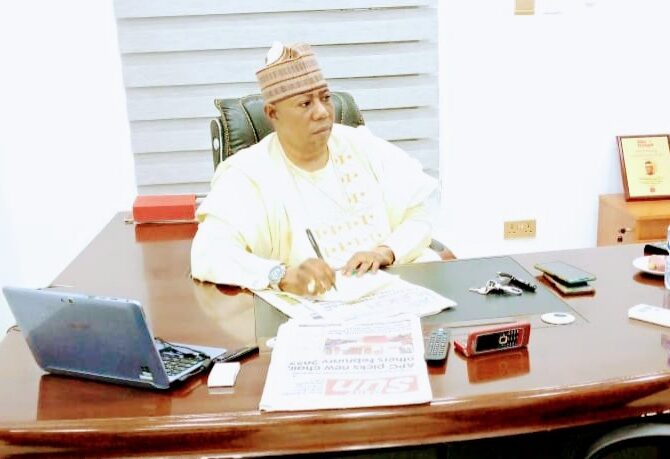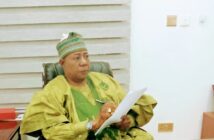Yearly, at individual and corporate governance levels, aspirations are set to be pursued, objectives to be achieved and missions to which we owe unflinching commitment. Where the vision is strong, the pursuit is fierce. In Nigeria, it is evident that the federal government’s multi-pronged approach in the year 2021 is working. The economy has witnessed positive growth in the last three quarters. It is a strong indication that the economy is progressing strongly despite the negative effects of COVID-19 globally and the security situation in the country.
The battle cry of the President Muhammadu Buhari-led presidency in the year 2021 is significant cut-down on insecurity, poverty, enhanced transparency in the conduct of government affairs and management of the nation’s commonwealth, increased provision of infrastructures as well as enhancing economic condition of Nigerians.
After a thorough research in capital expenditures, strategic economic planning of developed countries in Europe and other climes, it became clear why despite the political tension and security challenges in Nigeria, the President Muhammadu Buhari administration, with his deputy, Vice President Yemi Osinbajo, as the head of economic team, is being cored high in the international community.
In this pursuit, Buhari Osinbajo set out to pursue economic transformation with all the vigour available to it. They spent the year 2021 criss-crossing the length and breadth of the global investment space, all in a bid to explain to the world the ease of doing business in Nigeria.
This has yielded tremendous dividends even though a lot needs to be done. Just like the president has restated, he will not have respite until Nigeria’s reputation as an investment destination is restored.
The extent to which the people’s money can work for them for collective prosperity depends on how it is transparently managed. Commitment to great leadership ideals, coupled with shrewdness, is all that was needed in 2021 for President Buhari to prove that he is one of the great leaders the African continent has ever produced.
Buhari demonstrated that commitment with the passage of Petroleum Industry Bill (PIB) by the National Assembly in July 2021 and assented into law as the Petroleum Industry Act, 2021 (PIA) by the President on 16th August 2021. The president did not stop at seeing the law enacted but gave marching orders to the implementation committee to complete all processes for the successful operationalisation of the Act within 12 months.
With the new Act, the Department of Petroleum Resources (DPR), Petroleum Products Pricing and Regulatory Authority (PPPRA) and the Petroleum Equalisation Fund (Management) Board (PEF) were scrapped. Two new agencies were created – the Nigerian Upstream Petroleum Regulatory Commission (NUPRC) and the Nigerian Midstream and Downstream Regulatory Authority (NMDRA). The functions, assets, liabilities, as well as personnel of DPR, PPPRA and PEF were transferred to these agencies.
In line with the president’s avowed commitment to build road infrastructures in the country, the new NNPC Ltd marked 21 federal roads for rehabilitation at the cost of N621.2 billion across the six geopolitical zones spanning 1,804.6 kilometres. It has gotten approval already from the Federal Executive Council (FEC) under the Federal Government Road Infrastructure Development & Refurbishment Investment Tax Credit Scheme, pursuant to Presidential Executive Order 007 of 2019.
Most significant is the unflinching commitment of the President Buhari-led government to the 11.9km Second Niger Bridge. Year-on-year out, the project has continued to attract commensurate funding provision in the federal government’s budget. It is one legacy project of the Buhari administration that will never be forgotten in time and eternity because of its historical trajectory.
Apart from the Second Niger Bridge, other PIDF projects advancing remarkably include 120 km Lagos-Ibadan Expressway, 375 km Abuja – Kaduna – Zaria – Kano Expressway and the East West Road.
Though the focus is 2021, the establishment of InfraCo Plc in 2020 as a world class infrastructure development vehicle wholly focused on Nigeria, with combined debt and equity take-off capital of N15 trillion, to be managed by an independent infrastructure fund manager was floated. This project cannot be ignored because most of the initiatives are multi-years.
In addition, the president also launched the Nigeria Innovation Fund by the Nigerian Sovereign Investment Authority (NSIA). This is aimed at addressing investment opportunities in the domestic technology sector, including data networking, datacenters, software, Agri-tech, Bio-tech, and more.
In 2021, the revolution in the railway sector continued to attract government attention. Due to adequate budgetary provision the Itakpe-Ajaokuta rail line has finally been completed and commissioned after 30 years of its conception. On the 10th of March, 2021, the federal government kick started a $3 billion rehabilitation and reconstruction of the 1,443-kilometer (897-mile) Eastern Railway line that starts from the southeastern oil hub of Port Harcourt and terminates at the northeastern city of Maiduguri.
The rail line is expected to link Nigeria’s industrial and agriculture hubs, facilitating the easy movement of people, goods and services. When completed, it will connect Rivers, Abia, Imo, Enugu, Ebonyi, Anambra, Benue, Nasarawa, Plateau, Kaduna, Bauchi, Gombe, Yobe and Borno States. Progress is also being made on the upgrading of our Airports, with the state-of-the-art facilities in line with world class safety standards.
The Buhari government has also invested substantially in agriculture, which explains why the sector remains the biggest employer of labour in the country. The sectoral growth hints at the fact that the Buhari government’s intervention has been effective and is yielding the required outcomes. The government’s effort in rice and maize production is a huge success. Data shows that both increased significantly, and Nigeria’s yearly production figures have been highest in the last five years. This streak of high production has taken Nigeria to the first and second spots among rice paddy and maize producers in Africa respectively.
In the area of security, what most Nigerians consider as worsening insecurity would have been deplorable than this if not for the fact that the Buhari administration made funds available to provide military hardware to tackle terrorists, bandits, killer herdsmen and other criminal elements in the country. The procurement of the Super Tucano Jet is a case in point. In spite of everything, we can still give kudos to our security agencies for arduous task protecting lives and properties.
Buhari’s achievements in the education sector are also overwhelming. This has been made possible through his commitment of more than N1.7 trillion of capital intervention to Nigeria’s tertiary institutions through TETFund and other means. The approval of the six new colleges of education in the six geo-political zones of the country and the six new federal polytechnics are among numerous achievements of the Buhari administration. Again, the presidential approval for a new retirement age of 65 and length of service of 40 years for teachers in public basic and secondary school were heart-warming.
In the power sector, the implementation of a ‘Willing Buyer-Willing Seller’ policy has opened up opportunities for increased delivery of electricity to underserved homes and industries. With the execution of critical projects through the Transmission Rehabilitation and Expansion Programme, Nigeria is sure on its way to the national goal of improved power supply by 2025.
On efforts to empower the youth and other vulnerable groups by enhancing investments in the Social Intervention Programme, Buhari within 2021 approved the expansion of the National Social Register (NSP) by 1 million additional households. The Administration had earlier established a N75 billion Nigerian Youth Investment Fund created to boost the Nigerian economy through leverage and access to finance for youths.
The Fund is meant to serve as a catalyst to unleash the potential of the youth and to enable them to build businesses that will stimulate economic growth and create jobs. These accomplishments are a testament to the fact that all hands are on deck in establishing a solid foundation for even greater successes in future.
– Ibrahim is director, Communications and Strategic Planning, of the Presidential Support Committee (PSC)



